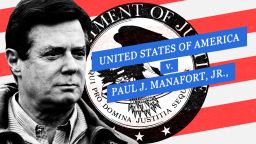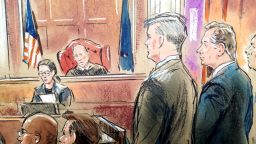Paul Manafort being convicted of eight crimes in a federal court Tuesday isn’t the end of his legal ordeal.
Several questions remain, including what this means for President Donald Trump, how this affects special counsel Robert Mueller’s investigation and what’s next for Trump’s former campaign chairman.

Here are five takeaways:
1. Mueller’s office survives its first courtroom test
Manafort’s conviction on eight tax fraud and bank fraud charges is, without a doubt, a boon to Mueller’s team of prosecutors.
It wasn’t the best outcome they could have hoped for – that would have been a straight 18 “guiltys” from the jury and no deadlocked charges.
Still, the special counsel’s office survived its first courtroom test.
The special counsel’s office had indicated previously that it continues to investigate Manafort, including for his alleged coordination with Russians while he worked on the Trump campaign. The special counsel’s office has been gaining steam in recent weeks, securing grand jury indictments against several alleged Russian hackers this summer and hauling a steady stream of witnesses before the grand jury in Washington.
Several of the people who got subpoenas or testified are associates of longtime Trump ally Roger Stone – himself a longtime former business partner of Manafort’s – leaving many close watchers of the investigation wondering: What’s next?
Mueller’s office also put key former Trump campaign adviser Rick Gates through his first intense test, three days of questioning before a jury about crimes he committed with his longtime boss Manafort. The prosecutors have likely learned his effectiveness, and how to use him better before a jury, given Tuesday’s results.

On top of that, Manafort faces a second federal criminal trial from the special counsel’s office, on foreign lobbying charges and alleged witness tampering. That trial is set to begin Sept. 17 in DC District Court, a venue with a judge who’s been harsher to Manafort since his indictment, where there may be a population that follows political developments in the news more closely and where voters overwhelmingly chose not to support Trump in the 2016 election.
2. Where the jury struggled to reach a verdict
The 12 jurors’ inability to reach a unanimous conclusion on 10 of Manafort’s charges raises some questions about the evidence and testimony prosecutors presented. No jurors have spoken publicly yet about what went on in the jury room.
Clearly, the jurors were able to follow the testimony and documentation that prosecutors presented on Manafort’s fraudulent IRS tax returns. They convicted him on all possible tax fraud counts, one for each year from 2010 to 2014.
But the foreign banking registration counts, which alleged that Manafort didn’t disclose to the Treasury Department accounts in Cyprus and other countries, came back as a mixed bag. Only one of those charges, regarding his 2012 filing, was a conviction. The jurors couldn’t agree on four related charges, for foreign banking disclosures in 2011, 2013 and 2014.
It’s unclear what caused the jury discrepancy, but it could range from Gates’ involvement in the accounts to the finer points of the federal law on disclosures, such as how they apply to businesses like Manafort’s consulting partnership DMP International. The jurors indicated they may have been having trouble with these charges on their first day of deliberations, when they asked the judge: “Is one required to file an FBAR if they own less than 50 percent of the account, do not have signature authority, but do have authority to direct disbursement of the funds?” That’s quite the detailed, technical question, and Judge T.S. Ellis did not provide them an answer further than his legalese-heavy, orally delivered jury instructions.
As for the five bank fraud conspiracy charges on which the jury failed to reach a verdict, the result could be tied up with jurors’ interpretations of Gates and other witnesses with immunity from prosecution. Did some jurors not believe his, the accountant’s and the bankers’ stories? Or did some jurors believe Gates and others were not as deeply involved as they said they were in Manafort’s alleged banking schemes?
Noticeably, the jury could not agree on any of the four bank fraud charges related to Federal Savings Bank, where the bank founder and chairman Stephen Calk allegedly sought Manafort’s boost in the Trump campaign in exchange for providing him loans. Ellis had raised the question to the lawyers earlier in the trial: Could Calk’s bank be defrauded if its leader wanted to make the loans no matter what? Perhaps jurors divided over the same question.
3. What do the guilty verdicts mean for Manafort?
The verdicts were not a good result for team Manafort. The charges on which the jury unanimously found Manafort guilty equal a maximum prison sentence of 80 years. Manafort is 69 years old. Even a sentence of 10 years could take from him prime years of his life.
Even if Manafort had been found not guilty, he would have stayed in jail, because the judge in the DC case revoked his bail.
Now with a conviction secured and a sentencing looming in Virginia federal court, Manafort has a steep uphill battle. If Mueller still takes him to trial for the foreign lobbying charges next month, Manafort will need a lot of things to work in his favor to be freed.
Truly, he needed to go two-for-two with acquittals in his criminal cases.
4. What happens next?
Manafort now could ask for Judge Ellis to intervene and declare him acquitted of any or all of the counts. His legal team asked for 30 days to make these requests, but Ellis has not yet said if he’ll extend the typical 14-day deadline following a jury’s verdict. We’ll learn in the coming weeks in court filings how Manafort’s team plans to attack the verdicts.
The defense team also could appeal the case at a later date.
Yet several players involved, including Manafort’s lawyers, emphasized the fairness of the trial proceedings, and lack of fairness is one of the areas defense attorneys can use to try to overturn a conviction.
Manafort’s defense lawyer Kevin Downing told news cameras outside the court as the jury deliberated Friday that he was “very happy about the fair trial that Judge Ellis ensured for Mr. Manafort.”
Downing repeated this on Tuesday, saying outside the courthouse that Manafort would “like to thank Judge Ellis for granting him a fair trial.” Downing added that he was “evaluating all of his options.”
Ellis commented in court after he dismissed the jury Tuesday that lawyers on both sides had provided “very effective and zealous representation.” That suggests Manafort’s lawyers weren’t ineffective, as viewed by the judge, as some defendants attempt to claim following their convictions.
As for the prosecutors, they’ll have to decide by Aug. 29 whether they want to seat a new jury to reach a verdict on the 10 charges that hung. The special counsel’s office could choose to drop those charges, especially since it is set to bring Manafort to trial in the other case in less than a month.
Ellis has not yet set a sentencing date for this case. When Manafort is sentenced, he’ll be given ample opportunity to speak directly to the judge, to ask for mercy.
5. The Trump card
Even now that Manafort has lost one case, there’s always the Trump card: The President retains the ultimate, sole authority to pardon him unconditionally.
Trump’s comments after the verdict didn’t shed light on whether a pardon could be on the table.
“Paul Manafort is a good man,” the President said Tuesday. “He was with Ronald Reagan. He was with a lot of different people over the years. I feel very sad about that. It doesn’t involve me” or Russian collusion, he said.




